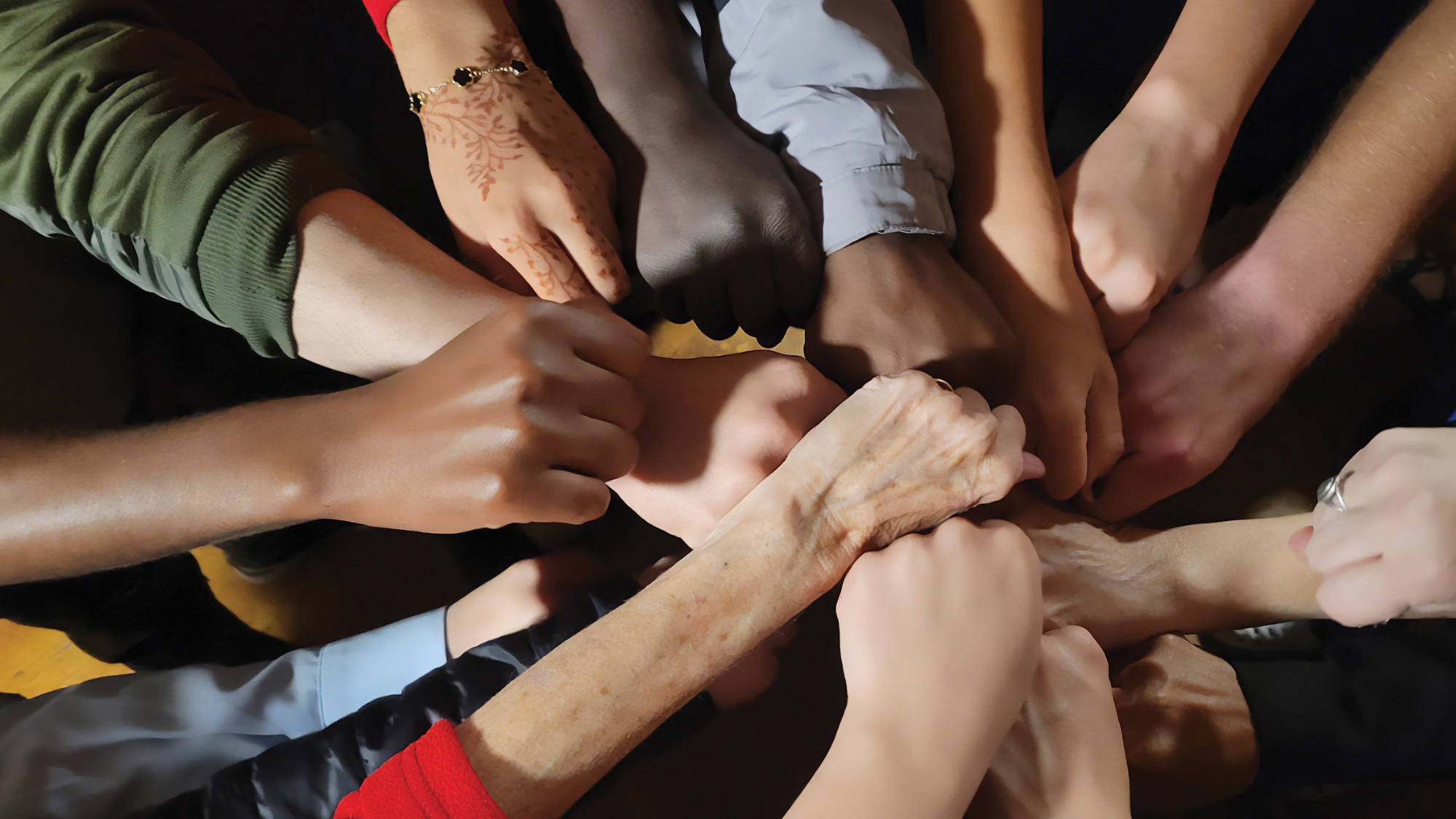The Drive To Do Good
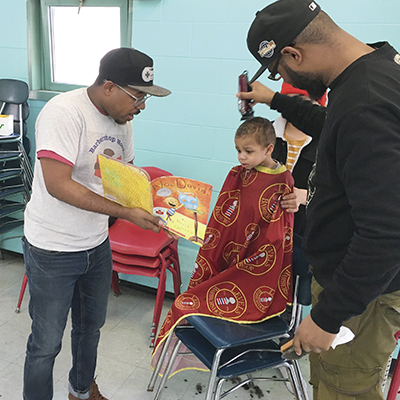
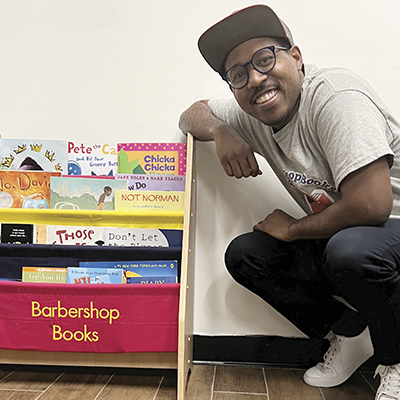
Alvin Irby says his project, Barbershop Books, is about bringing books to kids where they are are and helping them learn to identify as readers.
Alvin Irby ’07 looked in the mirror and decided it was time for a haircut.
When the final bell rang that afternoon, the first-grade teacher walked across the street from his school in the Bronx to a barbershop. Irby settled into the chair and was soon surrounded by the buzz of the clippers. As snippets of hair drifted to the floor, one of his students walked in and plopped down on the sofa, staring out the window, looking a little bored.
Irby thought, “Man, he should be practicing his reading! Someone should be putting children’s books in barbershops, so kids have books to read while they wait.”
In that moment, the idea for Barbershop Books was born. It would be several years before Irby could bring his dream to life, but with the help of a 2015 Wall Service Award from Grinnell, Irby’s nonprofit places colorful, kid-sized bookshelves and boy-approved books in barbershops in Black neighborhoods nationwide.
“That $25,000 Wall Award gave me a little bit more runway to be able to get to the next grant,” he says. “And here I am, all these years later, still working full time for Barbershop Books. Without the Wall Award, I would have had to find a job and work on Barbershop Books part-time.”
A Culture of Service
Since its founding, the ethos of Grinnell has been about making positive change in the world. Generations of Grinnellians have dedicated themselves to making the world a better place, from their involvement in the Social Gospel of the late 1800s to the New Deal in the
1930s to the issues making headlines today.
In 1996, Grinnell celebrated its 150th birthday with parties, lectures, concerts, and more, including the creation of the Joseph F. Wall ’41 Alumni Service Awards. The Wall Awards encourage alumni to imagine projects that contribute to the common good. If chosen, they receive unrestricted grants (currently up to $40,000) for their project. To date, the program has awarded grants to 68 alumni working in 18 countries.
Wayne Moyer, Rosenfield Professor of Political Science, says the Wall Award was designed as a tribute to Grinnell’s legacy of service. After the death of Joe Wall in 1995, the committee named the award in his honor. “He was inspirational to generations,” Moyer says. “It seemed appropriate to name it for him.”
More than 200 Grinnellians, many of them Wall’s former students, made generous gifts to fund the award and honor their professor. “It was a memory that a lot of people wanted to keep alive,” Moyer says.
Moyer, who chaired the sesquicentennial committee and has served on the Wall Award selection committee since its beginnings, says the program has maintained its emphasis on service. “We hoped that alumni would find something in their communities that they could do
that would provide tangible benefits to others — that’s still the center of it.”
Making a Difference
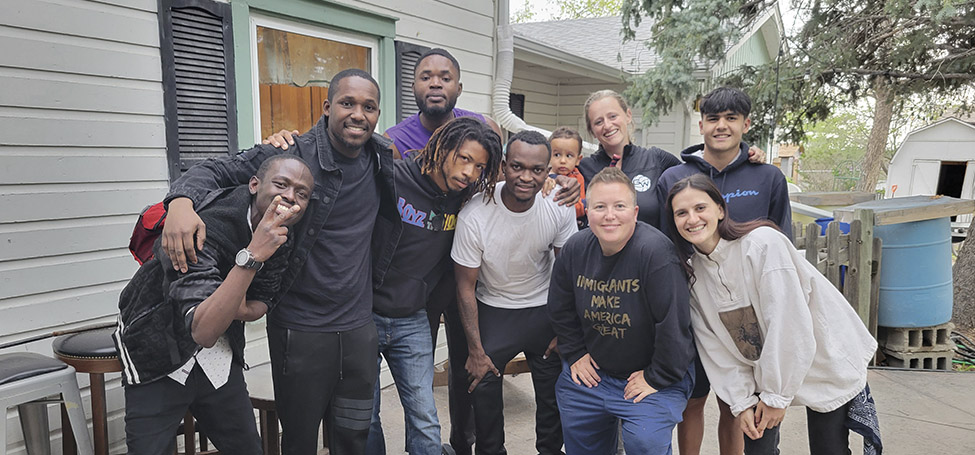
Renata Heberton used her Wall Award to create Angelica Village, an intentional community and nonprofit that supports programming and services for unaccompanied refugee minors, refugees, and others experiencing homelessness.
 What inspires Grinnellians to apply for a Wall Award? Each story is unique, of course, but a few overarching principles hold true.
What inspires Grinnellians to apply for a Wall Award? Each story is unique, of course, but a few overarching principles hold true.
For instance, almost all the recipients speak of wanting to make a difference. Renata Heberton ’06 says, “I’d always been trying to figure out my place in the world and how to make a difference, and what that could look like.”
Her project, Angelica Village in Lakewood, Colorado, provides programming and services for refugees and others experiencing homelessness. Her 2016 Wall Award allowed Heberton to take a leap of faith, quit her job, and make Angelica Village her full-time focus.
“I feel like the Wall Award was a catalyst,” she says. “Grinnell was the place that ultimately gave that support that allowed us to do something that impacts a lot of people in a significant way.”
Giving Back
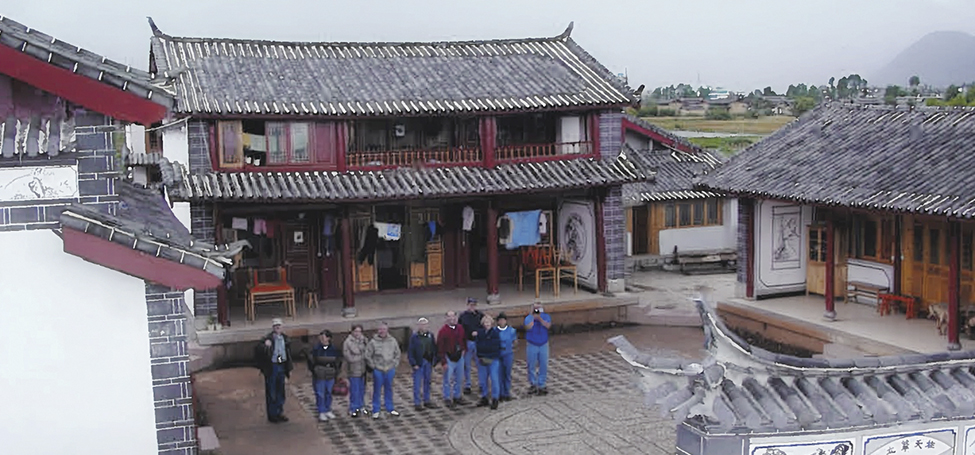
Scott Raecker (left) put his Wall Award to work at the Lijiang orphanage school in Lijiang, China, building new dormitory spaces for the children.
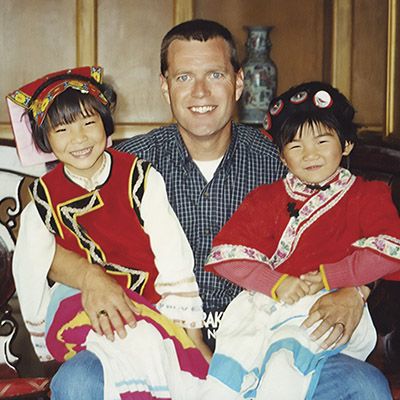 Many Wall Award winners also speak of responsibility — having been given much, they want to give back.
Many Wall Award winners also speak of responsibility — having been given much, they want to give back.
Scott Raecker ’84 says, “I think there’s a legacy at Grinnell — that you’re privileged to have such a great education, but there’s a responsibility that comes with that. How are you going to use that education to do good for others?”
For Raecker, Joe Wall exemplified Grinnell’s culture of giving back. “Professor Wall embodied that and inspired that in others,” he says.
Raecker’s project, funded in 2001, focused on the Lijiang Children’s Orphanage in rural China, where more than 300 kids lived in difficult conditions with no running water, inadequate food, and extreme crowding. With matching funds from Rotary, Raecker and his team installed solar panels, a water tank, and piping for showers. They built new living spaces and a greenhouse and purchased livestock for a self-sustaining farm.
Raecker had found his passion and has never looked back. The Shining City Foundation, created by Raecker and his partners, is still at work today in China and Uganda. “We really are trying to do good in the world,” Raecker says.
Bringing History to Life
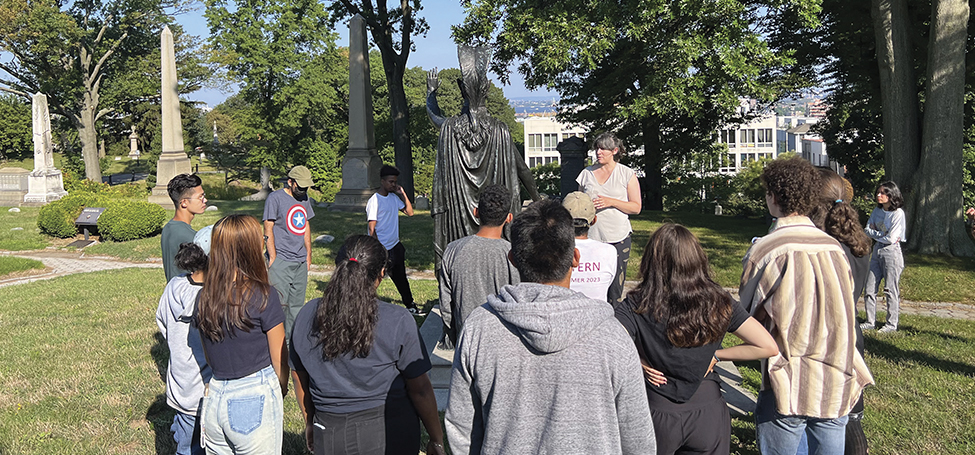
Rachel Walman’s Wall Award funded internships for students ages 14–20 to learn about history while also making important improvements to the monuments and landscape of Green-Wood Cemetery.
Some Wall Award winners want to share the love of learning they found at Grinnell.
Rachel Walman ’06 knows how to bring history to life, much like Joe Wall did. Through her Wall Award, she inspires students to make their own discoveries.
As director of education at Brooklyn’s Green-Wood Cemetery, Walman used her 2021 Wall Award to enhance a summer internship for high school students. Through hands-on work in the oldest parts of the cemetery — a children’s lot with burials in the late 1800s — interns made important improvements to 74 monuments and to the cemetery landscape, while learning about history through first-person research.
The internship nurtures a love for history and discovery, Walman says, and students learn about the variety of career paths and disciplines that intersect in a historic cemetery.
“This internship experience is unique and allows youth to have an extraordinary impact on a major cultural institution,” Walman says. “Without the Wall Award, we couldn’t serve as many youths as we do and we couldn’t engage them as effectively. It gave us a foundation to build on.”
One Life at a Time
Sometimes, the desire to help others grows out of personal experience. Scott Porter ’80 was a marathoner until a spinal cord injury in his 50s left him a paraplegic.
“I was going nuts, not being active,” he says. Then he discovered a type of wheelchair called the handcycle. “It’s got a lot of components like a bicycle.” Porter says. “But you propel it with your hands.”
The handcycle made a profound difference for him. “It contributed to my quality of life, my being healthy, my ability to do things,” Porter says. To share this discovery, he set up a lending program with different types of handcycles for people to try out before purchasing their own — often with a grant that Porter helped them apply for.
In 2014, Porter won a Wall Award for his lending program. In the decade since then, his handcycles have been lent out only five or six times. “You’re only talking about making a difference in 30 people’s lives,” he says. “But on the other hand, it’s like that story about the
little boy tossing starfish back into the ocean. For those 30, it made a big difference, right?”
Take Your Shot
Porter, who is serving on the Wall Award Committee, wants more Grinnellians to apply for the grant. “Put it together and try,” he says. “You could be pleasantly surprised.”
Raecker agrees, adding that it’s particularly important now to work for positive change. “It seems like we’re trending in the wrong way, some days, but there are a lot of good people doing a lot of great work out there, so I’m always encouraged.”
He adds, “Grinnell College invests in its alumni to do good in the world. I’m proud of my experience at Grinnell — I am very thankful to have had that experience, and even more thankful that they continue to inspire the next generation of leaders to make that difference.”

Scott Porter shows off a Grinnell College jersey sewn for him by Desiree Winkler Meyer ‘80.

Porter rides his handcycle in RAGBRAI, the Register’s Annual Great Bike Ride Across Iowa. He devised the protective nose shield seen in the photo himself, to protect him from sunburn.

The Wall Service Awards, named in honor of Joe Wall, offer a tangible way for Grinnellians to live out their admiration for Wall and their aspiration to a life of service.
Grinnell College at Its Best
Liane Ellison Norman ’59 remembers being transfixed in the ARH lecture room as Professor Joseph F. Wall ’41 breathed life into the past. Although it was almost 70 years ago, she still recalls clearly how his storytelling kept the class riveted. “He really made history come alive,” Norman recalls.
Wall was a Grinnell graduate and professor as well as a nationally recognized scholar, writer, and historian. But above 84all, it is his teaching that students still remember decades later.
The late George Drake ’56, Grinnell alumnus, professor, and president, recalled his experience in Wall’s classroom in an interview with Marshall Poe ’84 on the “Authors and Artists” podcast. “I would say the great genius of Joe was narrative. He could just weave a narrative in class. It was just spellbinding.”
George McJimsey ’58, historian and biographer of Harry Hopkins 1912, said, “[Joe Wall] was and will always remain my example of Grinnell College at its best.”
Learn how to apply for a Wall Award and read about other past award winners.

